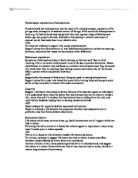A second psychological theory comes from expressed emotion. Expression emotion is a family communication style that involves high levels of criticism, hostility and emotional over-involvement. Research has demonstrated that individuals from families with high expressed emotion are 3.7 times more likely to relapse than in families from low expressed emotion.
Supportive research from expressed emotion comes from Brown (1972),who found patients who returned to homes where a high level of expressed emotion was expressed, showed a greater tendency to relapse compared to those returning to a low expressed emotion household.
Vaughn and Leff (1976) found similar results. They found 51% of schizophrenics relapsed in highly expressed emotion homes, compared to only 13% in low expressed emotion homes.
Support from the notion of expressed emotion has now become a well established “maintenance” model of schizophrenia and many prospective studies have been conducted with support to the expressed emotion hypothesis among many cultures.
However, the view that families interaction plays a causal role in the development of schizophrenia lacks empirical support, and such approaches have difficulty in explaining why abnormal patterns develop in some, rather than all of the children in the family. The research is only correlational.
Also, there is a lack of explanatory power, given that communication may be similar between schizophrenic and non-schizophrenic families, the theory lacks validity-they don’t account for the varied expression and severity of the disorder.
Researchers have also investigated the physiological abnormalities associated with schizophrenia, leading to cognitive malfunctioning. According to Hemsley’s neuropsychological model of schizophrenia, one of the cause of this disorder is the result of a breakdown in the relationship between previously stored information and new, incoming sensory information. This theory claims schizophrenics schemas are not activated, are subjected to sensory overload, leading to possible superficial incidents being seen as highly relevant, explaining delusions.
This theory provides support for cognitive explanations of schizophrenia because although it may not explain schizophrenia, but provides explanations of the origins of particular symptoms.
However, as cognitive theories can only explain origins of symptoms, to explain schizophrenia fully ,this explanation would need to be combined with the biological model.
Psychological explanations of schizophrenia can be criticized as they are not scientific in comparison to other explanations, such as biological explanations. Also, psychological explanations do not tell us everything we need to know about the disorder because they are reductionist. This is because it only focuses on psychological explanations, eliminating possible biological explanations. Such explanations are a simplistic view of human behaviour, and of an extremely complex disorder.
In conclusion, according to the diathesis stress model schizophrenia is caused by both psychological and biological factors. The reasoning behind this theory is that certain individuals have a predisposition to the disorder, but will only go onto develop schizophrenia if they are exposed to stressful situations.
________________________________________
Your essay looks very good, but I think you might be missing out on a few AO1 marks by not explaining the theories themselves in enough detail, particularly the double-bind theory, but you definetly have enough breadth. Try to include the phrase "this prevents the development of an internally coherent construction of reality, manifesting the symptoms of schizophrenia." Examiners will like that and put a big fat tick next to it. Possibly discuss how it requires prolonged exposure.
You have an introduction paragraph at the beginning which I personally would cut out. Explaining the clinical characteristics in an essay that asks for Psychological explanations isn't going to gain you any marks; the question isn't asking for that. Just jump straight in there by saying "Psychological explanations of schizophrenia include..." That way you're not wasting any time writing paragraphs that the examiners will just draw a line through.
But overall, if I were an examiner, I'd give that an A.
Well done








